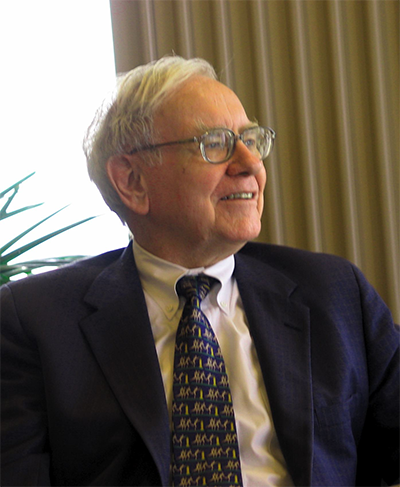
7 reasons why
- 1. You don’t need special skill to succeed
- 2. Passive beats active
- 3. Low fees are essential
- 4. The investment sins that will cost you dear
- 5. It’s extremely difficult to identify market-beating talent
- 6. People are overconfident
- 7. Invest through thick and thin
- Buffett puts his money where his mouth is
- How to replicate Buffett’s advice using ETFs
Warren Buffett is many things:
- One of the greatest investors of all time
- CEO of world-class firm Berkshire Hathaway
- An iconic global philanthropist
- Ever-present on the world rich-list

Yes, it’s true. Warren Buffett, the Oracle of Omaha, says that most people are better off with index funds. In other words, he believes we should all be in low-cost investing vehicles that track a major index – such as ETFs. Buffett spoke out in favour of trackers as far back as 1993:
“By periodically investing in an index fund, for example, the know-nothing investor can actually out-perform most investment professionals. Paradoxically, when ‘dumb’ money acknowledges its limitations, it ceases to be dumb.”
Source: Berkshire Hathaway shareholder letter 1993.
"A low-cost index fund is the most sensible equity investment for the great majority of investors.”
Source: The Little Book of Common Sense Investing, 2007.
1. You don’t need special skill to succeed
“You don’t need to be an expert in order to achieve satisfactory investment returns. But if you aren’t, you must recognize your limitations and follow a course certain to work reasonably well. Keep things simple and don’t swing for the fences. When promised quick profits, respond with a quick ‘no.’”
“The goal of the non-professional should not be to pick winners – neither he nor his ‘helpers’ can do that – but should rather be to own a cross-section of businesses that in aggregate are bound to do well. A low-cost S&P 500 index fund will achieve this goal.”
Source: Berkshire Hathaway shareholder letter 2013.
2. Passive beats active
“A lot of very smart people set out to do better than average in securities markets. Call them active investors. Their opposites, passive investors, will by definition do about average. In aggregate their positions will more or less approximate those of an index fund. Therefore, the balance of the universe — the active investors — must do about average as well. However, these investors will incur far greater costs. So, on balance, their aggregate results after these costs will be worse than those of the passive investors.”
Source: Berkshire Hathaway shareholder letter 2016.
“I think that the people who buy those index funds, on average, will get better results than the people that buy funds that have higher costs attached to them, because it's just a matter of math."
Source: Berkshire Hathaway Annual Shareholder Meeting 2002, courtesy of CNBC.
3. Low fees are essential
“Costs skyrocket when large annual fees, large performance fees, and active trading costs are all added to the active investor’s equation. Funds of hedge funds accentuate this cost problem because their fees are superimposed on the large fees charged by the hedge funds in which the funds of funds are invested. A number of smart people are involved in running hedge funds. But to a great extent their efforts are self-neutralizing, and their IQ will not overcome the costs they impose on investors. Investors, on average and over time, will do better with a low-cost index fund than with a group of funds.”
Source: Berkshire Hathaway shareholder letter 2016.
4. The investment sins that will cost you dear
“Investors, of course, can, by their own behavior, make stock ownership highly risky. And many do. Active trading, attempts to ‘time’ market movements, inadequate diversification, the payment of high and unnecessary fees to managers and advisors, and the use of borrowed money can destroy the decent returns that a life-long owner of equities would otherwise enjoy.”
“The commission of the investment sins listed above is not limited to ‘the little guy.’ Huge institutional investors, viewed as a group, have long underperformed the unsophisticated index-fund investor who simply sits tight for decades. A major reason has been fees: Many institutions pay substantial sums to consultants who, in turn, recommend high-fee managers. And that is a fool’s game.”
Source: Berkshire Hathaway shareholder letter 2014.
5. It’s extremely difficult to identify market-beating talent
“There are a few investment managers, of course, who are very good – though in the short run, it’s difficult to determine whether a great record is due to luck or talent. Most advisors, however, are far better at generating high fees than they are at generating high returns. In truth, their core competence is salesmanship.”
Source: Berkshire Hathaway shareholder letter 2014.
“The problem simply is that the great majority of managers who attempt to over-perform will fail. The probability is also very high that the person soliciting your funds will not be the exception who does well.”
“Further complicating the search for the rare high-fee manager who is worth his or her pay is the fact that some investment professionals, just as some amateurs, will be lucky over short periods. If 1,000 managers make a market prediction at the beginning of a year, it’s very likely that the calls of at least one will be correct for nine consecutive years. Of course, 1,000 monkeys would be just as likely to produce a seemingly all-wise prophet. But there would remain a difference: The lucky monkey would not find people standing in line to invest with him.”
“(...) The bottom line: When trillions of dollars are managed by Wall Streeters charging high fees, it will usually be the managers who reap outsized profits, not the clients. Both large and small investors should stick with low-cost index funds.”
Source: Berkshire Hathaway shareholder letter 2016.
6. People are overconfident
“Over the years, I’ve often been asked for investment advice, and in the process of answering I’ve learned a good deal about human behavior. My regular recommendation has been a low-cost S&P 500 index fund.“
“I believe, however, that none of the mega-rich individuals, institutions or pension funds has followed that same advice when I’ve given it to them.”
“The wealthy are accustomed to feeling that it is their lot in life to get the best food, schooling, entertainment, housing, plastic surgery, sports ticket, you name it. Their money, they feel, should buy them something superior compared to what the masses receive. In many aspects of life, indeed, wealth does command top-grade products or services. For that reason, the financial ‘elites’ – wealthy individuals, pension funds, college endowments and the like – have great trouble meekly signing up for a financial product or service that is available as well to people investing only a few thousand dollars. This reluctance of the rich normally prevails even though the product at issue is – on an expectancy basis – clearly the best choice. My calculation, admittedly very rough, is that the search by the elite for superior investment advice has caused it, in aggregate, to waste more than $100 billion over the past decade.”
“Human behavior won’t change. Wealthy individuals, pension funds, endowments and the like will continue to feel they deserve something ‘extra’ in investment advice. Those advisors who cleverly play to this expectation will get very rich. This year the magic potion may be hedge funds, next year something else. The likely result from this parade of promises is predicted in an adage: “When a person with money meets a person with experience, the one with experience ends up with the money and the one with money leaves with experience.”
Source: Berkshire Hathaway shareholder letter 2016.
- Some believe they deserve to do better.
- Financial professionals make vast profits feeding this belief.
“Indeed, the unsophisticated investor who is realistic about his shortcomings is likely to obtain better long term results than the knowledgeable professional who is blind to even a single weakness.”
Source: Berkshire Hathaway shareholder letter 2013.
7. Invest through thick and thin
“American business – and consequently a basket of stocks – is virtually certain to be worth far more in the years ahead. Innovation, productivity gains, entrepreneurial spirit and an abundance of capital will see to that. Ever-present naysayers may prosper by marketing their gloomy forecasts. But heaven help them if they act on the nonsense they peddle.”
Source: Berkshire Hathaway shareholder letter 2016.
“The main danger is that the timid or beginning investor will enter the market at a time of extreme exuberance and then become disillusioned when paper losses occur.”
“The antidote to that kind of mistiming is for an investor to accumulate shares over a long period and never to sell when the news is bad and stocks are well off their highs. Following those rules, the ‘know-nothing' investor who both diversifies and keeps his costs minimal is virtually certain to get satisfactory results.”
Source: Berkshire Hathaway shareholder letter 2013.
"So I would pick a broad index, but I wouldn't toss a chunk in at any one time. I would do it over a period of time because the very nature of index funds is that you are saying, I think America's business is going to do well over a -- reasonably well -- over a long period of time, but I don't know enough to pick the winners and I don't know enough to pick the winning times."
Source: Berkshire Hathaway Annual Shareholder Meeting 2002, courtesy of CNBC.
Buffett puts his money where his mouth is
While Buffett is one of the all-time great investors he knows his wife is not. Hence his will stipulates that the money left to his wife, Astrid Menks, is invested in index funds:“My advice to the trustee could not be more simple: Put 10% of the cash in short-term government bonds and 90% in a very low-cost S&P 500 index fund. (I suggest Vanguard’s.) I believe the trust’s long-term results from this policy will be superior to those attained by most investors – whether pension funds, institutions or individuals – who employ high-fee managers.”
Source: Berkshire Hathaway shareholder letter 2013.
- 90% is a highly adventurous equity asset allocation.
- The 10% bond component is so large that it will easily meet Menks’ essential needs regardless of temporary market turbulence on the equity side.
How to replicate Buffett’s advice using ETFs
Classic, vanilla ETFs fit Buffett’s description of index funds because they’re:- Index trackers that follow a broad, reputable benchmark like the S&P 500 or MSCI World.
- Extremely low cost
- A passive investing vehicle
- Flip the Region dropdown to Europe. (See the left-hand column, just under Bonds.)
- Set the Maturity dropdown to 0-3 to replicate Buffett’s short-term government bond suggestion for his wife.
- Otherwise select the bond maturity that suits your situation and objectives.
“Keep buying it through thick and thin, and especially through thin.”
















